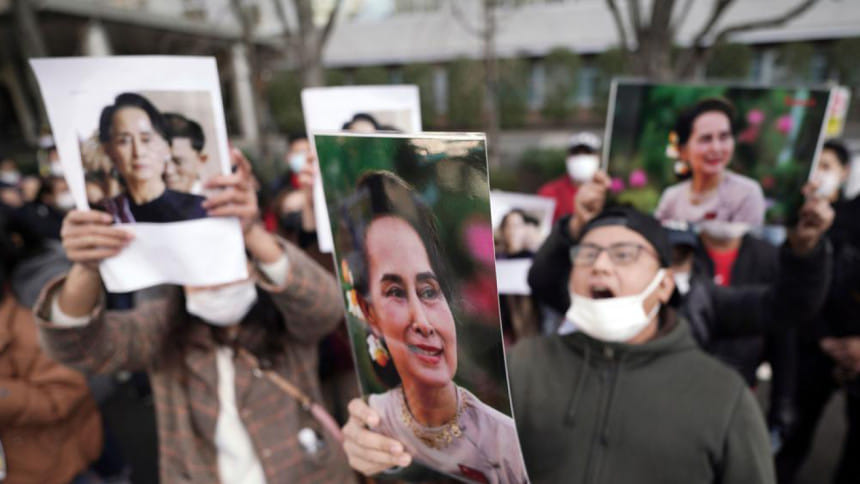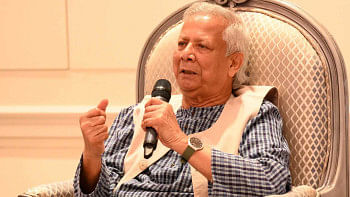Coup in Myanmar: Military imposes internet blackout

Myanmar saw its largest anti-coup protests yet yesterday with young demonstrators spilling on to the streets to denounce the country's new military regime, despite a nationwide internet blackout aimed at stifling a growing chorus of popular dissent.
Soon before nearly all lines of communication in and out of the country went dark, an Australian advisor to ousted civilian leader Aung San Suu Kyi told media he had been detained.
The shutdown did not stop thousands of demonstrators from gathering across Myanmar's largest city yesterday, beginning on a road near Yangon University where many flashed the three-finger salute that has come to symbolise resistance to the army takeover.
"Down with the military dictatorship!" crowds yelled, many donning red headbands -- the colour associated with Suu Kyi's National League for Democracy party.
A large riot police contingent blocked nearby roads, with two water cannon trucks parked at the scene.
At least two other groups of demonstrators marched south to downtown Yangon's Sule Pagoda, carrying posters of Suu Kyi and president Win Myint to call for their release.
The protests ended by dusk, and demonstrators have vowed to return to the streets today.
Further north in Mandalay, as many as 2,000 people were also protesting, AFP reporters on the ground said.
All were out to condemn dawn raids that brought a sudden halt to the country's 10-year experiment with democracy on Monday, just as lawmakers elected in national polls last November were due to sit in parliament for the first time.
Army chief Min Aung Hlaing seized power alleging voter fraud, although the electoral commission says it has found no evidence of widespread irregularities in the November vote.
The junta announced a one-year state of emergency and has promised to hand over power after new elections, without giving a timeframe.
Nobel Peace laureate Suu Kyi, 75, has been charged with illegally importing six walkie-talkies, while ousted President Win Myint is accused of flouting COVID-19 restrictions. Neither has been seen since the coup. Their lawyer said they were being held in their homes.
Australian professor Sean Turnell became the latest figure associated with Suu Kyi -- and the first confirmed foreign national -- to be detained.
"I'm just being detained at the moment, and perhaps charged with something. I don't know what that would be," Turnell, a longtime economic advisor to the Nobel laureate, told the BBC.
Online calls to protest the army takeover have prompted bold displays of defiance, including the nightly deafening clamour of people around the country banging pots and pans -- a practice traditionally associated with driving out evil.
"We only want the elected government of the parties that won the election," said a street vendor Kyi Lwin late Friday night.
"We reject this kind of military dictatorship."
A civil disobedience movement has been building in Myanmar all week, with doctors and teachers among those refusing to work. Every night people bang pots and pans in a show of anger.
The coup has sparked international outrage, with the United States considering sanctions against the generals and the UN Security Council calling for the release of all detainees.
It has also deepened tensions between the United States and China, which has close links to Myanmar's military. Secretary of State Antony Blinken pressed top Chinese diplomat Yang Jiechi in a phone call on Friday to condemn the coup, the State Department said.
UN Secretary General Antonio Guterres said a special envoy to the country had made "first contact" with Myanmar's deputy military commander to urge the junta to return power to the civilian government.
State media in Myanmar reported Saturday that officials had spoken with diplomats the previous day to respond to the international outcry.
As protests gathered steam, the junta ordered telecom networks to freeze users out of access to Facebook, arguably the country's main mode of communication.
"We strongly urge the authorities to order the unblocking of all social media services," a Facebook representative said. "The people of Myanmar need access to important information and to be able to communicate with their loved ones."
The platform had hosted a rapidly growing "Civil Disobedience Movement" forum calling for strikes at civil service offices and hospitals.
The military widened its efforts to stifle dissent on Friday when it demanded new blocks on other social media services including Twitter.
Norway-based Telenor yesterday said it had complied with an order instructing telecoms to shut down the country's entire mobile data network.
"We have employees on the ground and our first priority is to ensure their safety," a statement from the firm said.
Some internet-savvy users had managed to circumvent the social media block with VPN services but by midday online traffic had slowed to a standstill.
"People in Myanmar have been forced into a situation of abject uncertainty," said Ming Yu Hah of Amnesty.
"An expanded internet shutdown will put them at greater risk of more egregious human rights violations at the hands of the military," she added.
The United Nations human rights office said on Twitter that "internet and communication services must be fully restored to ensure freedom of expression and access to information."

 For all latest news, follow The Daily Star's Google News channel.
For all latest news, follow The Daily Star's Google News channel. 



Comments